Related Research Articles
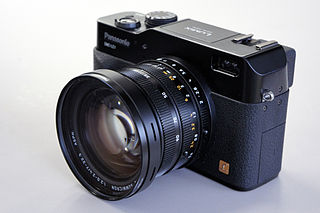
Lumix is Panasonic's brand of digital cameras, ranging from pocket point-and-shoot models to digital SLRs.

The Lumix DMC-L1 is Panasonic's first DSLR camera, and was announced in February 2006. This camera adheres to the Four Thirds System lens mount standard, making it the first non-Olympus Four Thirds camera, and thus confirming that the Four Thirds System is a semi-open standard such that compatible camera bodies can be built by different companies.

The Panasonic Lumix DMC-FZ7 is a six megapixel superzoom bridge digital camera that utilizes Panasonic's Venus II Engine. It features a 12× zoom lens and several modes of operation. It was replaced in 2007 by the DMC-FZ8

The Panasonic Lumix DMC-FZ8 is a 7 megapixel superzoom bridge digital camera made by Panasonic. As with most Panasonic Lumix cameras, it uses a Venus Engine, in this case, the Venus Engine III. It supports the Raw image format and has the same sensor size and zoom level as its predecessor, the Panasonic Lumix DMC-FZ7.

The Lumix DMC-L10 is Panasonic's second digital single-lens reflex camera (DSLR), a follow-up to the previous Lumix DMC-L1 model. It was announced in August 2007, and, like the Lumix DMC-L1, this model uses the Four Thirds System lens mount standard and contains some basic parts provided by Olympus.

The Panasonic Lumix DMC-TZ3 was a compact 'Travel Zoom' camera announced on January 31, 2007. It was the successor to the 2006 TZ1 announced in 2006, and was released in parallel with the TZ2. It has a 10× optical zoom with the focal range equivalent to 28–280 mm coupled with Mega O.I.S. image stabiliser. It is a fully automatic compact camera, without manual control of aperture and shutter time. The TZ3 was awarded both the TIPA "Best Superzoom Digital Camera" award and the EISA "European Compact Camera" award in 2007. The TZ4, TZ5, and TZ50 succeeded the TZ2 and TZ3.
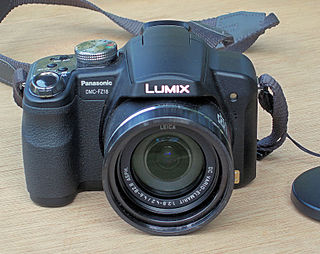
The Panasonic Lumix DMC-FZ18 is a superzoom bridge digital camera that features:
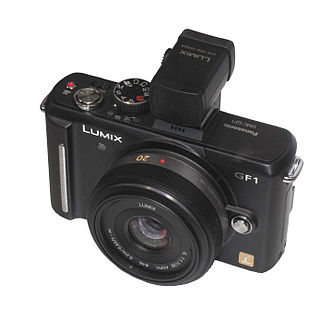
Panasonic Lumix DMC-GF1 was introduced in September 2009 as the third camera in Panasonic's Lumix G-series, using the Micro Four Thirds system. It was the first model in the "GF" line, which is primarily distinguished from the other Lumix G cameras by the lack of an integrated electronic viewfinder.

The Olympus PEN E-PL2, was announced in early January 2011 at the CES. This is Olympus Corporation's fourth camera that uses the Micro Four Thirds mount after the Olympus PEN E-P1, Olympus PEN E-P2 and Olympus PEN E-PL1. At the time it was announced, it had a US dollar MSRP of $599.99. As with earlier PEN models, the E-PL2 is aimed in between the point-and-shoot and D-SLR markets.
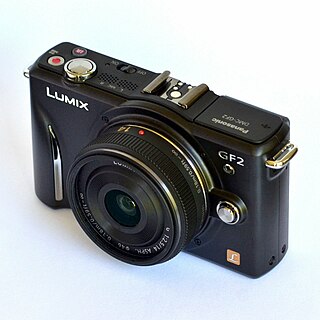
Panasonic Lumix DMC-GF2 is the sixth camera in Panasonic's Lumix G-series, using the Micro Four Thirds System.
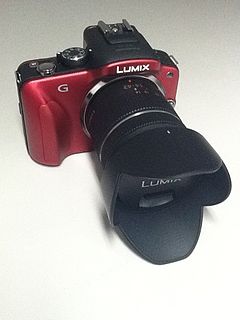
The Panasonic Lumix DMC-G3 is a digital mirrorless interchangeable lens camera adhering to the joint Olympus and Panasonic Micro Four Thirds System (MFT) system design standard. The Panasonic Lumix DMC-G3 is the eighth Panasonic MFT camera introduced under the standard and the thirteenth model MFT camera introduced by either Olympus or Panasonic, as of the G3 product announcement date.

Panasonic Lumix DMC-GF3 is the eighth camera in Panasonic's Lumix G-series adhering to the Micro Four Thirds System (MFT) design standard, and was announced in June 2011.

Panasonic Lumix DMC-GF5 is the ninth camera in Panasonic's Lumix G-series adhering to the Micro Four Thirds System (MFT) design standard.
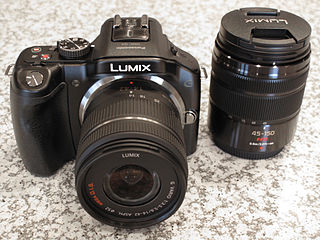
The Panasonic Lumix DMC-G5 is a digital mirrorless interchangeable lens camera adhering to the joint Olympus and Panasonic Micro Four Thirds System (MFT) system design standard. It is the twelfth Panasonic MFT camera introduced under the standard and the nineteenth model MFT camera introduced by either Olympus or Panasonic, as of the G5 product announcement date.
Panasonic Lumix DMC-3D1 is a digital camera by Panasonic Lumix. The highest-resolution pictures it records is 12.1 megapixels, through its 25mm Lumix DC VARIO x2.
Panasonic Lumix DMC-XS1 is a digital camera by Panasonic Lumix. The highest-resolution pictures it records is 16.1 megapixels, through its 24mm lens.
Panasonic Lumix DMC-LS5 is a digital camera by Panasonic Lumix. The highest-resolution pictures it records is 14.1 megapixels, through its 26mm Ultra Wide-Angle.

Panasonic Lumix DMC-GF6 is a Micro Four Thirds digital camera by Panasonic Lumix with a 16 megapixel resolution sensor. It is the successor to the GF5. The GF6 adds Wi-fi with NFC, a 180 degree tilting screen and a mode dial with a customizable lever. It also has an improved grip and better ISO performance when compared to its predecessor. It comes bundled with the new Panasonic Lumix G Vario 14-42mm f/3.5–5.6 II Asph., Mega O.I.S., which boasts better build quality, a smaller design and improved sharpness.
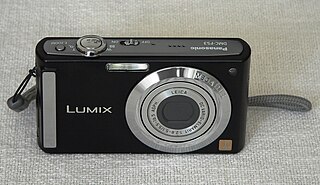
The Panasonic Lumix DMC-FS3 is a digital ultracompact camera announced by Panasonic on January 29, 2008.
References
- ↑ "Panasonic Lumix DMC-FS5: Digital Photography Review". www.dpreview.com. Retrieved 2015-03-19.
- ↑ Trenholm, Richard. "Panasonic Lumix DMC-FS5". CNET. Retrieved 2020-07-06.
| This camera-related article is a stub. You can help Wikipedia by expanding it. |